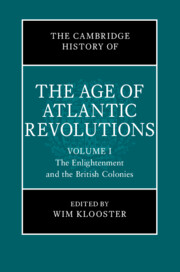Book contents
- The Cambridge History of the Age of Atlantic Revolutions
- The Cambridge History of the Age of Atlantic Revolutions
- The Cambridge History of the Age of Atlantic Revolutions
- Copyright page
- Contents
- Figures
- Maps
- Contributors to Volume i
- Preface
- Introduction
- Part I Enlightenment and Culture
- 1 Enlightenment and the American Revolution
- 2 Enlightenment and the French Revolution
- 3 Enlightenment and the Ibero-American Revolutions
- 4 Cultural Practices and Revolutions, c. 1760–1825
- Part II The British Colonies
- Index
3 - Enlightenment and the Ibero-American Revolutions
from Part I - Enlightenment and Culture
Published online by Cambridge University Press: 20 October 2023
- The Cambridge History of the Age of Atlantic Revolutions
- The Cambridge History of the Age of Atlantic Revolutions
- The Cambridge History of the Age of Atlantic Revolutions
- Copyright page
- Contents
- Figures
- Maps
- Contributors to Volume i
- Preface
- Introduction
- Part I Enlightenment and Culture
- 1 Enlightenment and the American Revolution
- 2 Enlightenment and the French Revolution
- 3 Enlightenment and the Ibero-American Revolutions
- 4 Cultural Practices and Revolutions, c. 1760–1825
- Part II The British Colonies
- Index
Summary
Revolutions sprang from a variety of causes rather than simply from Enlightenment. Iberia and Ibero-America absorbed whatever Enlightened ideas or practices responded to political, economic and social necessities. The Spanish and Portuguese governments sought thereby to tighten imperial control. Individual reformers, often independently of government, regarded the new ideas as instruments of amelioration. International conflicts and revolutionary movements in the United States and France, as well as internal tensions, introduced new factors and pressures. These accompanied the strains on both the Spanish and Portuguese governments during the war years between 1793 and 1808. The Portuguese government escaped the political collapse and crisis of legitimacy which befell Spain and its empire, and managed to reconstitute itself in Brazil. The Enlightenment had contributed greatly to the critique of Royal absolutism in both empires and of metropolitan dominance. A range of influential Enlightened figures emerged in each of the component territories of both monarchies. The roots of Iberian Liberalism may be traced to their ideas and actions. A counter-critique attacked Enlightened ideas along with Liberal constitutional forms. The ensuing polemic and its political manifestation, especially after 1814-15, blamed revolutionary activity on the influence of the Enlightenment.
- Type
- Chapter
- Information
- The Cambridge History of the Age of Atlantic Revolutions , pp. 106 - 131Publisher: Cambridge University PressPrint publication year: 2023

